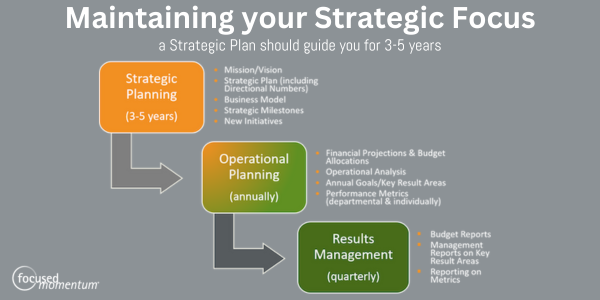3 essential elements of epic strategy
A great strategy is a great story. And, like all great stories, there are classic elements which, when expertly crafted, evolve a good plan into a...

Strategic planning participants often express the desire to be well prepared before the first group meeting. It is understandable that a dedicated and diligent new executive or up-and-coming leader might experience anxiety as they think about their first strategy discussion. After all, their boss will be in the room, all their peers and possibly a colleague or two with whom they don't see eye to eye. So how should they prepare to be successful at engaging in a process they know little about or have no experience in?
Strategic planning follows (or should follow) a different structure than management presentations, operational meetings, or even problem-solving sessions. For those that have not had the opportunity to participate before, all they know is this is where the direction is set.
Typically, every strategic planning meeting is proceeded by some assessment exercise: a survey and an interview, a brief group meeting where the issues to be discussed during the next planning cycle are identified. If you have been invited to the planning meetings, you should have participated in one of those assessment activities. Yet for many, that's not enough. They want to know how to be successful in engaging at the direction-setting level.
1. Collect your thoughts about what you see is working well in the organization today. Acknowledge what you, your team, or others are doing that are producing desired results. Strategy development is not about fixing things. It is about evolving from where you are to where you want to go, so having a good understanding of what is working well is always important before you start strategy development.
2. Brainstorm the list of issues you feel must be addressed for future success. Think about:
3. Compile and review your notes and then put your thoughts aside. Strategy Development discussions are often freewheeling and nonlinear. Your prepared thoughts will help you jump in when the discussion turns to an issue that you identified, but don't be too surprised if it quickly jumps to a different topic before a resolution is reached. This pattern is the norm in strategy development sessions.
Strategic thinking is about disrupting incremental thinking to open new space for new strategies to make big leaps for future success. We find that when a group is thinking strategically, the issues identified during the assessment fall away, and new priorities are identified. These new priorities are set based on the next big strategic goal rather than to resolve today's issues.
So, prepare your thoughts, but most importantly, prepare your mind to explore and engage in new thinking with your fellow strategists. A shift in your mindset will set you up for great first strategic planning efforts.
Want to run your next strategy session like a pro? Download our free checklist.

A great strategy is a great story. And, like all great stories, there are classic elements which, when expertly crafted, evolve a good plan into a...

Recently, the CEO of a potential new client shared a striking story. Her company grew rapidly, expanding from 50 to 200 employees in 18 months. While...

For those with a fiscal calendar starting in January, the autumn months will be dominated by one thing: budgeting. By mid-September, the budget...